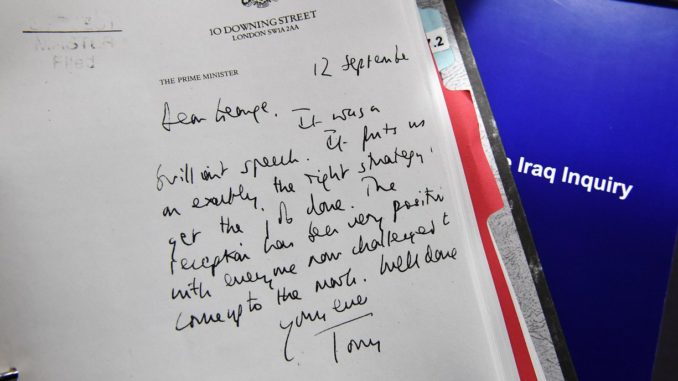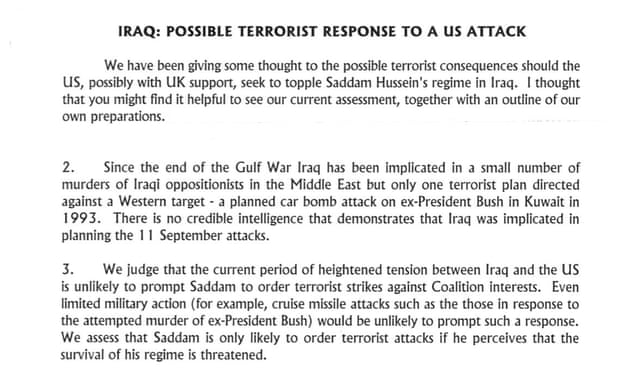
[the Guardian UK] Twenty-nine messages to then US president, released as part of Chilcot report, give insight into buildup towards invasion:
Tony Blair wrote to George W Bush eight months before the Iraq invasion to offer his unqualified backing for war well before UN weapons inspectors had completed their work, saying: “I will be with you, whatever.”
In a six-page memo marked secret and personal, the then British prime minister told Bush, US president at the time, in July 2002 that the removal of Saddam Hussein would “free up the region” even if Iraqis may “feel ambivalent about being invaded” and could well fight back.
It was one of several confidential letters Blair sent to Bush in the run-up to the Iraq war, during the conflict and in its devastating aftermath, released on Wednesday as part of the Chilcot report.
They paint a picture of Blair wrestling with the absence of evidence of weapons of mass destruction (WMDs) in Iraq, struggling to persuade Bush to try to win UN support for invasion, of his own conviction of the moral rightness of toppling a dictator, and of his belief that a new Arab democracy would rise afterwards.
They also reveal the stark transition Blair underwent in the immediate aftermath of the toppling of Saddam as he told Bush of his deepest fears that “if it falls apart, everything falls apart in the region”.
Before the invasion, Blair had seemed driven by the historic impact of what he and Bush were proposing.
Six days after airstrikes on Baghdad began in 2003, he told Bush: “This is the moment when you can define international politics for the next generation: the true post-cold war world order. Our ambition is big: to construct a global agenda around which we can unite the world, rather than dividing it into rival centres of power.”
He ridiculed the wave of anger emerging from Europe about the invasion, saying “a ludicrous and distorted view of the US is clouding the enormous attraction of the fundamental goal”. Blair cited an unnamed European leader, who in conversation compared the then US defence secretary, Donald Rumsfeld, to Osama Bin Laden.
“Rational people are behaving very stupidly,” he complained.
But a little over two months later, on 2 June 2003, with Saddam toppled and Iraq in chaos, Blair’s tone changed after he visited Iraq. “The task is absolutely awesome,” he told Bush, “and I’m not sure we’re geared for it. This is worse than rebuilding a country from scratch. We start from a really backward position. In time, it can be sorted. But time counts against us.”
He said: “If it falls apart, everything falls apart in the region.” His three-point plan involved boosting security in Baghdad, speeding up rebuilding and “putting on TV things people want to watch – local soaps, football etc”.
By 5 September 2003, conditions in Iraq were getting worse. “As you predicted, the aftermath and rebuilding Iraq [sic] is proving the most difficult phase,” Blair told Bush.

A month later, a tone of panic seemed to enter the letters. “Iraq on the ground is tough,” he told the US president. “We lose people to terrorist attacks. We haven’t found enough on WMDs … In the international community there is a sense of schadenfreude. Blair and Bush started it. It’s their problem, let them sort it.”
Far from showing doubt about his interventionism, however, Blair complained to Bush that his belief the struggle for control of Iraq “will determine the spirit of the future world” was “all getting lost just in Iraq and WMD”. He said Iraq was “a test case for how determined we were to confront the threat. My worry now is that the world thinks: well, Iraq was a tough deal, so they won’t try that again.”
“We have to be absolutely unapologetic,” he urged Bush.
Over the preceding months the two leaders had an intimate working relationship, the letters show. In September 2002, Blair scrawled Bush a handwritten note praising a “brilliant speech” that “puts on exactly the right strategy to get the job done”. He signed off: “Well done. Yours ever, Tony”.
In the “with you, whatever” memo sent in July , Blair warned Bush that “in Britain, right now I couldn’t be sure of support from parliament, party, public or even some of the cabinet”, adding that winning political support in Europe would be tougher still.
But he then set out a recipe for providing evidence against Iraq. “If we recapitulate all the WMD evidence; add his attempt to secure nuclear capability; and, as seems possible, add an al-Qaida link, it will be hugely persuasive over here. Plus, of course, the abhorrent nature of the regime.”
Blair devoted six lines to post-Saddam planning. He said his toppling “should lead in time to a democratic Iraq governed by the people”, but concluded “just swapping one dictator for another seems inconsistent with our values”.
Blair was also clear about the difficulties ahead. “The planning on this and the strategy are the toughest yet,” he said. “This is not Kosovo. This is not Afghanistan. It is not even the Gulf war.
“Getting rid of Saddam is the right thing to do. He is a potential threat. He could be contained. But containment, as we found with al-Qaida, is always risky. His departure would free up the region. And his regime is probably, with the possible exception of North Korea, the most brutal and inhumane in the world.”
Blair proposed that “the US could do it alone, with UK support” but warned “recriminations would start fast” if it went wrong. He had many worries, fearing what would happen if “the Arab street finally erupted”, “the Iraqis feel ambivalent about being invaded”, “real Iraqis, not Saddam’s special guard, decide to offer resistance” or if Saddam “let off WMD”. As a result, he concluded: “I’m keen on a coalition, not necessarily military, but politically.”
In the face of domestic and European opposition, he suggested: “At the moment, oddly, our best ally might be Russia!”
On the Arab world, he said hardline countries who don’t “fall into line” should be offered “a very hard-headed partnership or put them on the ‘axis of evil list’”. He also told Bush that more effort needed to go into the war in Afghanistan, saying: “It is our one act of regime change so far, so it had better be a good advertisement.”
Few people, apart perhaps from Blair himself, would now argue that either adventure could be considered as that.
